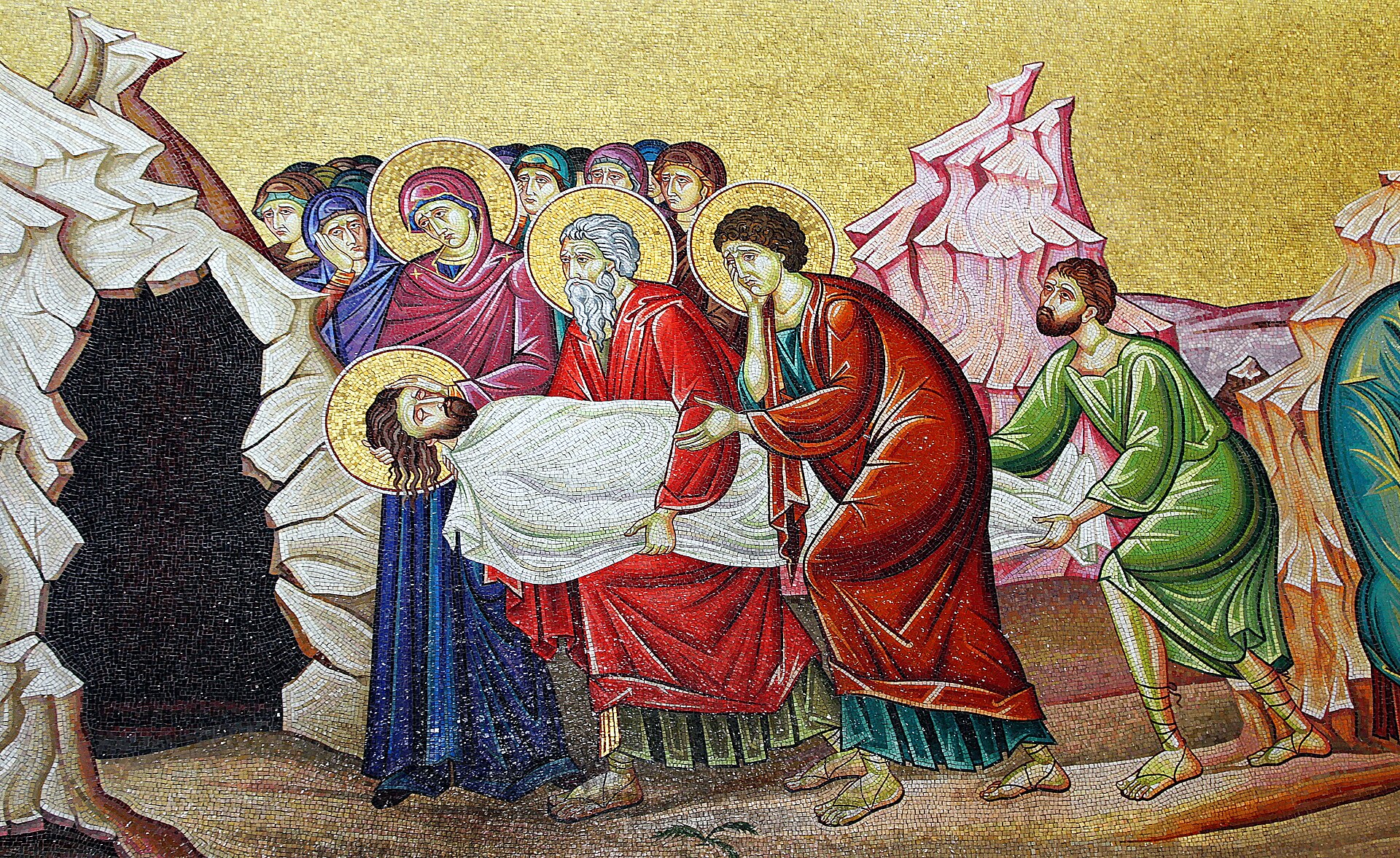The Burial of Jesus
50 Now there was a good and righteous man named Joseph who, though a member of the council, 51 had not agreed to their plan and action. He came from the Jewish town of Arimathea, and he was waiting expectantly for the kingdom of God. 52 This man went to Pilate and asked for the body of Jesus. 53 Then he took it down, wrapped it in a linen cloth, and laid it in a rock-hewn tomb where no one had ever been laid. 54 It was the day of Preparation, and the Sabbath was beginning. 55 The women who had come with him from Galilee followed, and they saw the tomb and how his body was laid. 56 Then they returned and prepared spices and ointments.
On the Sabbath they rested according to the commandment. [Luke 23:50-56, NRSV]
 Wall mosaic of the entombment of Jesus near the Stone of anointing at Church of the Holy Sepulchre
Wall mosaic of the entombment of Jesus near the Stone of anointing at Church of the Holy Sepulchre
We reproduce below a reflection by Karl Rahner, sourced from Karl Rahner, The Great Church Year (New York: Crossroad, 1993), 168-169.
——————————–
Holy Saturday is a strange day, mysterious and silent. It is a day without a liturgy. This is, as it were, a symbol of everyday life which is a mean between the abysmal terror of Good Friday and the exuberant joy of Easter. For ordinary life is also mostly in between the two, in the center which is also a transition and can only be this.
Perhaps the worst in life is already behind us. Though this is not certain, and perhaps not even radically true. For the very end is still before us. Nevertheless, may be we have “come through”; perhaps the old wounds are no longer bleeding; we have become wiser and more modest in our desires; we expect less from ourselves and others, and our resignation is not too painful.
This may be just as well. We cannot always have everything in one exercise, as a medieval mystic says. We need not always be horrified by the incomprehensibility of life nor entranced by its glory, we need not always celebrate the highest liturgy of life or death. Ordinariness, too, may be a blessing. But this ordinariness of the in-between must be understood as a transition from Good Friday to Easter.
The human being, especially the Christian, has not the right to be modest, she must maintain her infinite claim. The fact that her pain is bearable must not be allowed to replace her blessed duty to hope for the infinite joy of eternity. Because God is, he may demand all, for he is all. Because death has died in Christ, our resignation must also die.
The Holy Saturday of our life must be the preparation for Easter, the persistent hope for the final glory of God. If we live the Holy Saturday of our existence properly, this will not be a merely ideological addition of to this common life as the mean between its contraries. It is realized in what makes our everyday life especially human: in the patience that can wait, in the sense of humour which does not take things too seriously, in being prepared to let others be first, in the courage which always seeks for a way out of the difficulties.
The virtue of our daily life is the hope which does what is possible and expects God to do the impossible. To express it somewhat paradoxically, but nevertheless seriously: the worst has actually already happened; we exist, and even death cannot deprive us of this. Now is the Holy Saturday of our ordinary life, but there will also be Easter, our true and eternal life.
Copyright © Dr. Jeffrey & Angie Goh, April 2025. All rights reserved.
To comment, email jeffangiegoh@gmail.com.
